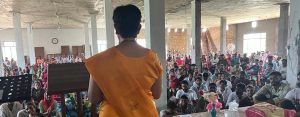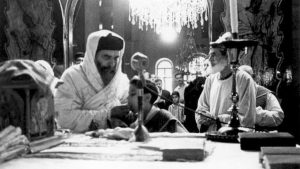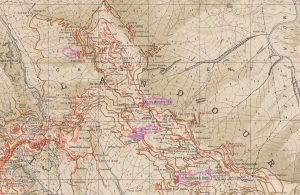With the view that opposes your own, always paint it in its best light.
Whether it be personal research, or public debate, or relational conflict the idea is to listen so carefully, so dispassionately, that the most compelling representation of the view we expect to reject is the one with which we engage. So we are never caught painting our own view in its best light, while the opposing view is left looking glum, in its worst light. That is just a cheap shot that has no lasting impact. We are listening, primarily, to understand rather than to respond. Our argument (with that research), our perspective (in that debate) and our resolution (of that conflict) will be far stronger, if this principle is followed.
On our first day in Vietnam this advice surfaced again.
In the morning we watched the debate among those hopefuls for the Democratic Party’s nomination as the next President of the USA. Ten people on a stage arguing with each other … I love it. The fact is that they share an overwhelming agreement on most issues (just wait until the debate with the Republican candidate for this to become clear!). And yet, what is the principle at work on that stage? ‘Paint the others in their worst light on a specific issue so that the light can shine better on me.’ This leads to a debate that does not compel as ‘cheap shots’ and prepared statements prevail.
In the afternoon we walked across to the military museum. The museum details the story of the way the Vietnamese overcame the ‘French colonialists’ and then, just a surprisingly few years later, the way they engaged and overcame the ‘American invaders’, or the ‘American imperialists’, or the ‘America enpire’ (sic). On display outside were trucks, tanks, planes, bombs – mostly ones captured from the US forces. On display inside was room after room filled with photographs and memorabilia. It was a sobering experience. History not as I learned it.
My point? It is a simple one. One hopes that the strongest Democratic candidate for 2020 will be someone who garners the support of their party because they paint opposing views and other candidates in their best light – and not just because they raise the most money. While the Vietnam War is seen widely to be a regrettable part of American history, it is by immersing ourselves in these Vietnamese voices and visuals that this fact hits home.
On our second day in Vietnam, I introduced Barby to Jacob Rees-Mogg.
I had never heard of this chap until a few weeks ago. He is from an upper class, privileged Etonian background and comes complete with a posh accent. He is a Conservative MP, recently appointed as Leader of the House, but also quaintly referred to as the ‘Minister for the 19th Century’, as his perspective and way of talking seems out-of-step with the modern world. I stumbled across his name after he made some gaffe with a tweet during the recent Cricket World Cup. I followed through on it all, trying to paint him in his best light, and came out the other side in agreement with him. People were taking offence at something silly and insignificant. He is quite a funny guy…
Buoyed by a few laughs, I kept watching. I stumbled upon his advocacy of right-wing politics undergirded by a devout Catholic life. It was fascinating. Making a case for Thatcherian economics being good for the poor? I gasped, even as the audience laughed – a taste of it here. [By the way, I suspect he is right when he observes that far more people have been lifted out of poverty in India during capitalist times, than socialist ones]. Watching him defend his views on same-sex marriage and abortion demonstrated his intellectual courage – a taste of it here & here – as he faced up to the ‘intolerance of tolerance’ in the media where tolerance seems to be operational only with the views with which they agree, rather than the views with which they disagree! Of what value is such tolerance?!
My point? If you want to be an effective advocate of left-wing politics and ethics (as I suspect many readers of this post will want to be), then engage with a Jacob Rees-Mogg. Don’t flick him off the ideological table with a flourish. Paint him and his views in their best light. Engage with them – and your advocacy of your own perspective will be the stronger for it.
A lot is at stake here.
What kind of thinker do you want to be?
Do you want merely to surf the wave of public opinion? Accept the prevailing narrative, usually enthusiastically? Go with the flow? Get up on the soap box and shout a bit, emboldened by the knowledge that a ‘minority report’ can be the only challenge? Maybe more of an !-thinker…
Or, do you want to swim upstream? Question the prevailing narrative, usually annoyingly? Go against the flow? Sit down on the couch and reflect a bit, recognising that the most powerful ideas in society are the ones about which we cannot be critical – and so you choose to critique them? Maybe more of a ?-thinker…
Here is my concern. I love reading about history and the way people lined-up on either side of the pivotal debates. Currently, I am reading Jonathan Fenby’s Crucible on the ‘thirteen months that forged our world’ (in 1947-1948). So many debates, especially as the world tried to move on from colonialism and from World War II at the same time. But let’s be careful. As we project ourselves back into history, imagining ourselves in the midst of these debates … if we are merely !-thinkers in today’s world, then we are likely to have been merely !-thinkers back then in their world. If this is the case, the sad truth is that in our imaginings we will probably end up being disgusted with ourselves and the side of history on which we find ourselves.
[26/05/23: I was thinking these thoughts again with the Parihaka musical last week, directed by Stephen Worsley. A horrible conflict in the history of Aotearoa-New Zealand… We sit here in 2023, a little self-righteously, and imagine that if we lived back then, we’d have been on the side of the Måori. Well, if you are a !-thinker—surfing the wave of public opinion, without the courage to swim upstream—then let me tell you a little secret. Almost certainly, you’d have lined up back then on the side of the ugly, violent British/Europeans and not be disgusted with yourself for doing so].
nice chatting
Paul
About Me

the art of unpacking
After a childhood in India, a theological training in the USA and a pastoral ministry in Southland (New Zealand), I spent twenty years in theological education in New Zealand — first at Laidlaw College and then at Carey Baptist College, where I served as principal. In 2009 I began working with Langham Partnership and since 2013 I have been the Programme Director (Langham Preaching). Through it all I've cherished the experience of the 'gracious hand of God upon me' and I've relished the opportunity to 'unpack', or exegete, all that I encounter in my walk through life with Jesus.
Recent Posts
Football helps me train preachers. See, when you speak to me about football—or, ‘footie’—I need to know where your feet are before I can understand what you mean. Are your feet in Ireland, or Brazil, or the USA, or NZ—or in crazy Australia? It must be the most fanatical sporting nation in the world. Within…
Having been born in 1959, I don’t remember much about the 1960s. But I have heard a lot. Hippies. Drugs. Rock ‘n Roll. Assassinations. Moon-walking. A quick trip across to ChatGPT informs me immediately that it was ‘a transformative decade across the world’—marked by the civil rights and feminist movements, Cold War tensions, consumerism and…









